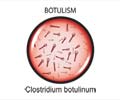A nasal spray vaccine on trial has been found to be effective in protecting against a major botulism toxin which can trigger paralysis.
The researchers are pioneering a botulism vaccine that adds a second layer of immune protection against exposure to botulinum neurotoxins (BoNTs). It would prime the disease-fighting cells in mucous membranes lining the nose, that are most likely to be exposed first, along with those in the blood."In this study, we found that our vaccine could provide complete protection in one dose against one of the seven BoNTs, which strongly suggests that the same platform could be applied to build a multi-component vaccine against the remaining six," Nature quoted Mingtao Zeng, Ph.D., assistant professor within Department of Microbiology and Immunology at the University of Rochester Medical Centre, principal investigator as saying.
"With these findings, we believe the design of a safe and inexpensive subunit vaccine can now proceed rapidly," Zeng added.
A specific end-piece protein called heavy chain 50-kDa fragment (Hc50) enables BoNT/C to enter the bloodstream.
In the study conducted using mouse model, to insert Hc50 and prime the immune system against it, researchers used gene therapy.
The team used a disabled virus to deliver BoNT/C Hc50 as a mucosal vaccine against botulism.
Advertisement
Past studies have shown that adenoviruses expressing protein antigens can be delivered by the mucosal route.
Advertisement
The study showed that all mice that received larger dose of the BoNT/C-HC50 vaccine had survived by seven weeks after toxin challenge with no botulism symptoms.
"We have demonstrated for the first time that a single, intranasal vaccination of an adenovirus-based vector encoding a humanized HC 50 of BoNT/C can provide full protection in vaccinated mice against botulinum neurotoxin type C," Zeng said.
"We look forward to finalizing a vaccine, the most likely candidates for which would be active military and emergency responding personnel in forward areas."
The study appears in Nature journal Gene Therapy.
Source-ANI
SAV











